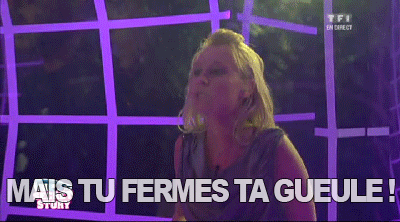10 French words that are difficult to translate
10 perles de mots français qui se traduisent mal en anglais
Just like there are words in English that are difficult to translate into French, there are many French words and concepts that are difficult to translate into English.
I like to think of them as the pearls of a language. Let’s take a look at some of my favorites.
Flâner
Flâner has a similar meaning to hang out, but it’s quite different in some ways.
Flâner means to hang out somewhere, usually walking, and without a goal. It can also mean being lazy, such as on a Sunday morning.
You might have seen a sign in some French speaking countries: pas de flânage, or flânage interdit. It literally means: we don’t want anyone hanging out here without buying anything! It usually warns teenagers to spend time around a store, drinking alcohol and hanging around.
Here’s how to use flâner.
J’aime aller flâner sur le Plateau (à Montréal), surtout le week-end.
I love to leisurely walk around the Plateau, especially during the weekends.
Aujourd’hui, j’ai juste le goût de flâner.
Today, I just want to hang out.
Profiter de
If you know Spanish, the word aprovechar is similar in meaning to profiter de. It doesn’t simply mean enjoy, or take advantage of, but also make the most out of something.
Profite bien de tes vacances!
Have a good holiday! (But also: make the most out of it.)
J’ai profité de mon passage à Montréal pour manger de la poutine.
I took advantage of my visit to Montreal to eat some poutine.
J'ai profité du fait qu’il était là pour lui demander de l’aide.
I took advantage of the fact that he was there to ask him for help.
La vie est courte, profitez-en.
Life is short, make the most of it (or live it to the fullest).
Une gueule
La gueule is the mouth of animals, including our friendly pets. This makes it a predestined source of slang and insults.
Ferme ta gueule!
Shut up!
J’ai envie de lui casser la gueule.
I just want to beat him/her up.Il a une sale gueule.
He looks creepy. I don’t trust this guy by the looks of him.Elle a une grande gueule.
She has a big mouth.
J’ai la gueule de bois.
I have a hangover.
C’est n’importe quoi
N’importe quoi literally means anything.
But saying c’est n’importe quoi has more the meaning of “nonsense.” It means you find something ridiculous, difficult to understand, and slightly offensive, but sometimes also just funny. You can even use it as a noun.
Ce spectacle était tellement mal organisé. C’était du gros n’importe quoi!
This show was poorly organized. They were such amateurs!
Mon coloc se lève à tous les jours passé 10 heures, comme un adolescent. Son horaire, c’est vraiment n’importe quoi.
My roommate gets up every day past 10, like a teenager. His schedule is just ridiculous.
Quand même
Quand même is a very useful expression that I don’t hear enough from my students. It literally means even when, but the meaning is closer to still, anyway, really.
Quand même for “anyway”
The easiest way to use quand même is to use it to mean anyway and still when disregarding a problem or impediment.
Je vais quand même te dire bonne fête aujourd’hui, même si j’ai oublié ton anniversaire hier.
I'm still going to say happy birthday today, even though I forgot your birthday yesterday.
Les ventes sont quand même bonnes cette année, même si j’aurais espéré qu’elles soient plus élevées.
Sales are still quite good this year, although I wish they were higher.
Quand téléphone vibre dans mes poches, je me dis que je n'ai pas le temps de répondre, mais que je regarde quand même l'afficheur.
When the phone vibrates in my pocket, I tell myself that I don't have time to answer, but I look at the screen to see who’s calling anyway.
Quand même can also aknowledge a problem it itself.
Ça reste quand même un problème.
Still, it’s a problem.
Finally, quand même can be used for emphasis, usually with a sense of being annoyed or outraged.
C’est quand même incroyable d’agir comme ça!
It's unbelievable to act like this!
Quel vulgaire personnage, quand même!
What a vulgar person!
Il est trop tôt pour se lever. Six heures, ce n’est pas si tôt que ça, quand même!
It's too early to get up. Well, six o'clock isn't that early!
Se débrouiller
Quelqu’un de débrouillard is someone who knows how to get out of trouble, who is shrewd or clever.
Se débrouiller can translate a bit like get around, manage or find solutions to problems.
It comes from the noun brouillard which means fog. You could imagine that clever person “unfogging” any situation they find themselves in.
Une artiste plutôt débrouillarde a réussi à reproduire créer une œuvre 3-D très réaliste.
A rather resourceful (female) artist managed to reproduce a very realistic 3-D work.
On a eu plusieurs problèmes mécaniques lors de notre voyage de vélo, et on a dû apprendre à se débrouiller.
We had several mechanical problems during our bike trip, and we had to learn how to manage.
Dépaysant
Dépaysant comes from the verb dépayser, which is translated as provide with a pleasant change of scenery. But there’s the added meaning of being completely different than what you normally experience.
There is also the noun dépaysement.
This word comes from the noun paysage, which means landscape or scenery. So it’s something that changes you from what you normally know and see every day, usually in reference to traveling, but not always. Here are some examples.
J’aime les voyages qui sont dépaysants.
I like trips that are exotic, that change me from my everyday life.
Cet artiste à l’avant-garde du théâtre présente une spectacle dépaysant et dérangeant.
This artist at the forefront of theater presents a disturbing and exotic show.
Ce café brésilien offre un dépaysement total en plein cœur de Londres.
This Brazilian café offers a total change of scenery in the heart of London.
Les retrouvailles
This plural noun means reunion with someone or a group of people you haven’t seen each other for a while.
J’ai revu un ami d’enfance que je n’avais pas vu depuis si longtemps. Trente ans après, quelles belles retrouvailles!
I saw a childhood friend I hadn't seen for so long. Thirty years later, what a beautiful reunion!
Au fur et à mesure
Au fur et à mesure translates roughly to as one goes along. But it has layers of meaning that can’t be translated. It’s almost impossible to explain without giving lots of examples.
Note that the word fur is only used in this expression, and never on its own or anywhere else.
Je l’invente au fur et à mesure.
I make it up as I go along.
Nous continuerons à vous tenir au courant au fur et à mesure que nous aurons plus d'informations à partager.
We will continue to update you as we have more information to share.
Cette fonction va évoluer et s'améliorer au fur et à mesure des kilomètres avalés par les voitures de Tesla sur les routes.
This feature will evolve and improve as Tesla's cars travel further down the road.
Je me sens de plus en plus proche de mon père au fur et à mesure que je vieillis.
I feel closer and closer to my father as I get older.
As you can see, au fur et à mesure is often best translated in English with as. But a layer of meaning is lost. There is a sense of constant evolution and transformation in the expression au fur et à mesure.
Incontournable
Something incontournable is something considered essential, or something that can’t be ignored. It can be an adjective or a noun.
Madame Bovary est un classique incontournable de la littérature française.
Madame Bovary is a must-read classic of French literature.
10 incontournables pour une visite à Montréal.
10 must-see destinations on a visit to Montreal.
Le blé est une céréale incontournable pour l’alimentation mondiale.
Wheat is an essential cereal for the world diet.
Elle était une figure incontournable du cinéma américain.
She was a major figure in American cinema.
6 more French words and expressions that are difficult to translate
Although what I just shared were very common words, I’d like to also give you a few more, among my favorite expressions in French that just don’t have an English equivalent.
Faire la grasse matinée
Faire la grasse matinée is not only get up late on a weekend morning, but also hang around lazily in your pajamas, make yourself a guilt-free breakfast, and take it really easy without leaving the house. It’s all of those things at the same time.
Qu’est-ce que tu as fait samedi? Pas grand-chose! J’en ai profité pour faire la grasse matinée.
What did you do on Saturday? Not much! I took the opportunity to sleep in and be really lazy.
Pas sortable
Sortir is going out. Sortable is literally having the ability to go out. So, pas sortable is used to describe someone who, for some reason, is not presentable in public. Perhaps because of the way they dress, but usually more for their manners.
Mon mari, depuis la pandémie, n’est pas sortable.
I can’t be seen in public with my husband, since the pandemic. He’s lost his social skills!
Cet enfant n’est pas sortable!
This kid is impossible to be around.
La gourmandise
La gourmandise is similar to gluttony.
But gluttony conjures images of excess, of gorging oneself with food, la gourmandise is seen more as a weakness, a penchant for sweets, nothing to burn in hell for!
Some examples:
Manger avec gourmandise.
Eating with gusto.Je devrais arrêter, mais je vais me resservir une autre portion, par gourmandise.
I should stop, but I’ll go have seconds, because I can’t resist it.
Un empêchement
Avoir un empêchement is having an unforeseen problem that makes someone cancel a plan. Usually, it’s a good word to avoid giving too many details!
J’ai eu un empêchement. Est-ce qu’on pourrait reporter notre rendez-vous?
Something’s cropped up, can we reschedule our meeting?
Elle n’a pas pu venir à cause d’un empêchement de dernière minute.
She couldn’t come because of a last minute change of plans.
Inédit
This word means previously unpublished or unusual and original.
On a retrouvé une œuvre inédite de Marcel Proust.
A previously unpublished work by Marcel Proust has been found.
C’est une production inédite (d’une pièce de théâtre)
It's a new production (of a play)
Il a une façon assez inédite de chanter.
He has quite an unusual and original way to sign.
Une déformation professionnelle
Une déformation professionnelle is a work habit that carries over into personal life.
For example, if I teach French and I’m used to correcting vocabulary mistakes in the course of my work, I might be tempted to do the same with my friends. And then, if I’m made aware of that, I might say:
Désolé, c’est une déformation professionnelle!
An expert in body language, said:
« Chez moi, c'est devenu une déformation professionnelle ! À la terrasse des cafés, je ne peux m'empêcher d’analyser les passants. »
It has become a professional deformation for me! At the coffee shop, I can't help but analyze passersby."







Tres interessant et utile! Merci!